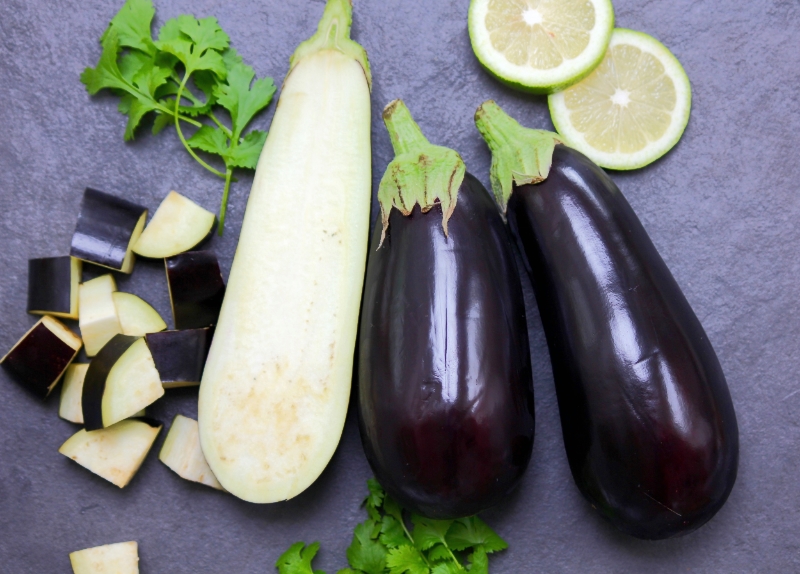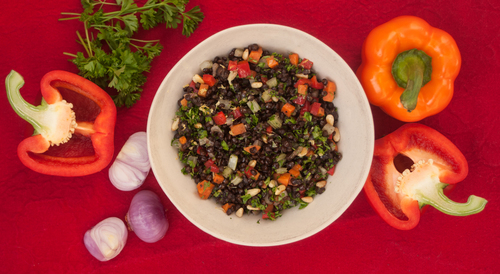Aubergine and Coriander 2 ways
Sautéed Aubergine Salad
Serves 2 as a main salad or 4 as a side dish
Ingredients
1 aubergine, cut into 2cm cubes light olive oil for frying
Juice of ½ lemon
Handful of fresh coriander, chopped
100g peppery salad leaves like rocket or watercress
Salt and pepper, to taste
Method
Sauté the aubergine in a large fying pan with plenty of oil, until golden brown on each side and nice and soft
Remove from the pan with a slotted spoon to a mixing bowl
Mix in lemon, chopped coriander and season well
Serve on a bed of the rocket or watercress leaves
Delicious with houmous or tahini dressing
Also great as a side dish with roast lamb
Houmous recipe
1 400g can of chickpeas, drained and rinsed
Juice of 1 lemon
3 ½ tblsp tahini
1 garlic clove, pressed
2 tblsp extra-virgin olive oil, plus more for serving
½ tsp ground cumin
Salt to taste
1 – 3 tblsp water to create smooth consistency, if desired
Dash ground paprika & olive oil, for serving
Method
In a processor blend the tahini and lemon juice until creamy, about 1 minute
Add the olive oil, pressed garlic, cumin and approx. ½ tsp salt and blend for 30 seconds, scrape the mixture off the sides of the mixing bowl and blend again for another 30 seconds
Add ½ of the drained, rinsed chickpeas and blend for 1 minute, then scrape the mixture of the sides of the bowl, add the remaining chickpeas and blend again until smooth. You may need to add 1 – 3 tblsp of water to get a creamy consistency, depending on how smooth you like it. Or you can keep a few chickpeas back and serve them on the houmous with a drizzle of olive oil
Tahini dressing
Ingredients
2-3 garlic cloves, pressed
salt
2 tbsp tahini
Juice of 1 lemon
1-2 tblsp water
1 tbsp olive oil
Method
Whizz the ingredients altogether with a wand blender, start with 1 tblsp water and add more if too thick
Or if you’d rather use a pestle and mortar - grind the garlic (no need to press it), tahini and salt. Slowly add in the lemon juice until all combined, then add water 1 tblsp at a time until a bit thicker than you want it and finally add the olive oil.
Baked Aubergine with coriander, cumin and lemon
Ingredients
Serves 6 as a dip or side dish
2 whole aubergines, washed
Large handful of chopped coriander
Pinch of cumin seeds
¼ lemon juice and zest
Salt and pepper
Optional – chilli powder or fresh chopped chilli
Method
Preheat the oven to 170°c
Bake the aubergines whole for around 50 minutes until nice and soft
Allow to cool and remove the green stalk
Whizz in a blender with the chopped coriander, cumin seeds, lemon juice and zest and season well
Serve as a dip or salad or on wholemeal, seedy or rye sourdough
Other ideas:
You could also whizz up the baked aubergine with a tin of drained chickpeas, a large handful toasted pinenuts, a regular handful of breadcrumbs, a clove or 2 of garlic, a large pinch of cumin, a large handful of chopped mint and some chilli to make veggie burgers. Then just gently heat through in a frying pan.
Aubergines, also known as Eggplant, are related to tomatoes, peppers and potatoes (from the Nightshade family*). Aubergines are technically berries -they are the fruit of the Solanum Melongena plant, with many seeds. The large purple varieties available in the UK are rich and buttery when cooked and do not need salting, rinsing and draining, which is often recommended in recipes to remove the bitterness of other varieties.
The main health benefits of aubergines come from the antioxidants they contain. One of the key antioxidants, Nasunin, an anthocyanin, gives aubergines their rich purple colour and helps protect the fatty acids we need for optimal brain function. Aubergines are also believed to be beneficial for managing blood glucose levels and cardiovascular health.
* Nightshade family vegetables are rich in alkaloids, which may not be tolerated well by those with auto-immune conditions. Cooking Nightshade family vegetables, avoiding green tomatoes and green/sprouting potatoes and peeling potatoes will help keep alkaloids to a minimum. It is always best to take advice from a health professional or registered nutritional therapist before removing food groups from your diet.







